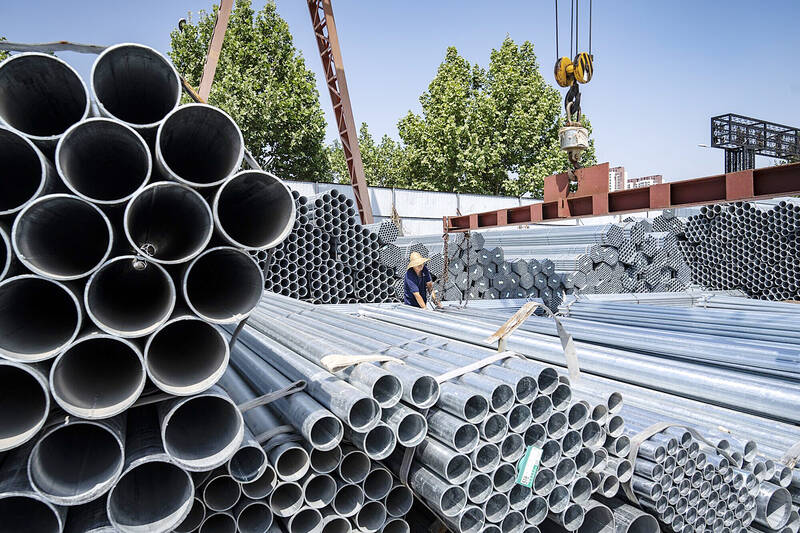China Steel Corp (CSC, 中鋼), the nation’s largest steelmaker, yesterday announced that it would cut steel quotation prices for domestic deliveries next month — its first price cut across the board since August last year — as the global steel market grapples with China’s excessive exports of low-priced products.
The move also reflects weak sentiment in the market dented by factors such as extreme weather, financial market turmoil and the off-season effect in summer, the Kaohsiung-based company said in a statement.
While the prices of iron ore have recently dropped to US$100 per tonne and those of coking coal have fallen to between US$210 and US$220 per tonne to help cut steelmaking cost, they are still at relatively high on a long term basis, it said.

Photo: Bloomberg
As a result, the company said it would lower the price of benchmark hot-rolled steel plates and coils by NT$600 per tonne and cold-rolled steel plates and coils by NT$500 per tonne.
The company would also decrease the price of anti-fingerprint electro-galvanized steel coils, used for construction, hot-dipped galvanized steel coils, used for home appliances, computers and other materials, and electrical steel coils by NT$500 per tonne each, it said.
“We will moderately lower prices in September to help domestic downstream customers secure orders and lessen the impact of low-priced steel imports,” China Steel said in the statement.
The company said the oversupply situation in China has continued to worsen, leading to a large number of low-priced products being exported.
ArcelorMittal SA, the world's second-largest steel producer, earlier this month said China’s aggressive exports were creating problems for the global steel industry, while China Baowu Steel Group Corp (寶武鋼鐵集), the world's largest, this week warned of a severe industry crisis as steel prices collapse.
In the first seven months of this year, exports of steel from China increased 21.8 percent year-on-year to 61.23 million tonnes, while average export prices decreased 24.8 percent from a year earlier, both adding pressure on the global steel market, China Steel said, citing data compiled by the Beijing-based China Iron and Steel Association.
Countries including Vietnam, Thailand and Turkey have recently responded with trade measures, including anti-dumping complaints against China’s hot-rolled steel products, the company said, adding that it would also apply for trade remedy measures in Taiwan to curb the arrivals of low-priced steel products from China.
On Tuesday, the company reported its net profit in the first half of the year surged 635.58 percent year-on-year to NT$1.96 billion (US$60.7 million).
Earnings per share rose to NT$0.13 from NT$0.02 in the same period a year earlier.
Consolidated revenue in the first seven months grew 1.2 percent annually to NT$217.6 billion, the company said in a regulatory filing.

Nvidia Corp chief executive officer Jensen Huang (黃仁勳) on Monday introduced the company’s latest supercomputer platform, featuring six new chips made by Taiwan Semiconductor Manufacturing Co (TSMC, 台積電), saying that it is now “in full production.” “If Vera Rubin is going to be in time for this year, it must be in production by now, and so, today I can tell you that Vera Rubin is in full production,” Huang said during his keynote speech at CES in Las Vegas. The rollout of six concurrent chips for Vera Rubin — the company’s next-generation artificial intelligence (AI) computing platform — marks a strategic

REVENUE PERFORMANCE: Cloud and network products, and electronic components saw strong increases, while smart consumer electronics and computing products fell Hon Hai Precision Industry Co (鴻海精密) yesterday posted 26.51 percent quarterly growth in revenue for last quarter to NT$2.6 trillion (US$82.44 billion), the strongest on record for the period and above expectations, but the company forecast a slight revenue dip this quarter due to seasonal factors. On an annual basis, revenue last quarter grew 22.07 percent, the company said. Analysts on average estimated about NT$2.4 trillion increase. Hon Hai, which assembles servers for Nvidia Corp and iPhones for Apple Inc, is expanding its capacity in the US, adding artificial intelligence (AI) server production in Wisconsin and Texas, where it operates established campuses. This

Garment maker Makalot Industrial Co (聚陽) yesterday reported lower-than-expected fourth-quarter revenue of NT$7.93 billion (US$251.44 million), down 9.48 percent from NT$8.76 billion a year earlier. On a quarterly basis, revenue fell 10.83 percent from NT$8.89 billion, company data showed. The figure was also lower than market expectations of NT$8.05 billion, according to data compiled by Yuanta Securities Investment and Consulting Co (元大投顧), which had projected NT$8.22 billion. Makalot’s revenue this quarter would likely increase by a mid-teens percentage as the industry is entering its high season, Yuanta said. Overall, Makalot’s revenue last year totaled NT$34.43 billion, down 3.08 percent from its record NT$35.52

PRECEDENTED TIMES: In news that surely does not shock, AI and tech exports drove a banner for exports last year as Taiwan’s economic growth experienced a flood tide Taiwan’s exports delivered a blockbuster finish to last year with last month’s shipments rising at the second-highest pace on record as demand for artificial intelligence (AI) hardware and advanced computing remained strong, the Ministry of Finance said yesterday. Exports surged 43.4 percent from a year earlier to US$62.48 billion last month, extending growth to 26 consecutive months. Imports climbed 14.9 percent to US$43.04 billion, the second-highest monthly level historically, resulting in a trade surplus of US$19.43 billion — more than double that of the year before. Department of Statistics Director-General Beatrice Tsai (蔡美娜) described the performance as “surprisingly outstanding,” forecasting export growth